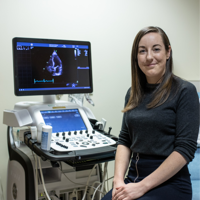
Lead cardiac scientist for Heart Failure and device services and NIHR clinical academic fellow at NHS
Make the most of every opportunity, including the opportunity to take some time, think about it, and take care of yourself!
About Maria...
Who am I?
"One of the points that I picked out was that I had been labelled as curious. As a researcher I need to be curious, but maybe I am a researcher because I am curious! I also develop new services so it's interesting that 'developer' came up although I always say I'm not very creative! I hope I am always fair and honest; we all have our off-days, but it's really important working with people to make sure everyone gets the same opportunities and for patients to get the same care."
What do I do?
"Healthcare science is a career I love. I work as a clinical academic cardiac scientist which means I work 50% clinically in the hospital, and 50% performing research. My research role is funded by the National Institute for Health Research on a 3 year fellowship to allow me to undertake my PhD with the University of Leeds, and I am employed by Leeds Teaching Hospitals Trust for my clinical work. I spend my time investigating how we can manage patients with heart failure who have a cardiac device, such as a pacemaker, or even prevent them from developing heart failure. Most of my research surrounds how we can programme the pacemakers to work better for each individual patient. I then use the results from my research in the hospital to develop new services or ways to help improve patients quality of life. I work as part of a multidisciplinary team, which means I work with doctors, nurses, allied health professionals and other healthcare scientists in specialist clinics where we make sure our patients are on the right medication and that their device is programmed specifically for them. I also teach at the University of Leeds and help train other cardiac scientists.There is nothing better than seeing a patient who is feeling short of breath or really unwell, and helping to make them feel better. "
How did I get here?
"Listen to my podcast to find out :)https://soundcloud.com/user-801113867/maria-paton-msc"
The life I live
"In my spare time I love to get outdoors and exercise and see new places and meet new people. Probably my favourite thing to do is to travel somewhere new and just walk around; see what the market looks like, and what strange foods are sold there, and just get a sense of what the buildings are like, and the vibe of a place!"
My typical day
"I’m a cardiac scientist (sometimes called a cardiac physiologist), and NIHR clinical academic research fellow. All of my work focusses on delivering better treatments and services for patients with heart failure whom have, or might benefit from, a cardiac device like a pacemaker. I specialise in ultrasound imaging of the heart to assess and diagnose heart function, and cardiac rhythm management, which is all around optimising cardiac device settings for each patient. My day-to-day practice is incredibly diverse, revolving around diagnosing and managing patients in our specialised service for patients with heart failure and a cardiac device, recruiting patients to my teams research programmes, collecting and analysing data, presenting findings, supervising students, and delivering lectures. Cardiac scientists’ can often be the only healthcare professionals reviewing patients, so this sparked my interest in how we might provide more effective patient management and how I began my career in research."
My qualifications
"I undertook A levels in Biology, Chemistry, English Lit and Psychology. After getting ABB I was awarded a place at the University of Leeds on the then Cardiac Physiology degree, which is now the cardiac science practitioner training programme. I graduated from the University of Leeds in 2011 and took up a permanent post within LTHT as a cardiac physiologist. In 2012 I obtained British Society of Echocardiography accreditation and in 2013 I began my Masters in Advanced Practice whilst working full time. In 2015 I was employed by Dr Klaus Witte (previous NIHR clinician scientist) and Professor Mark Kearney (British Heart Foundation chair) to lead the OPTpace study of 1800 patients across 3 hospitals within Yorkshire. I lead recruitment, consent, monitoring, diagnostic testing, data entry and follow-up for the study and am now analysing the results. I was also a lead physiologist for another large research study on Vitamin D in patients with heart muscle weakness. I collaborated on research into the effect of heart rate rise on exercise capacity in patients with CHF in 2015 (REF-JACC). This study has led to follow-on research for which I was a member of the design and study team investigating the effects of personalising heart rate rise based on individual measures of heart function. During 2015 I was also awarded a place on the first round of NIHR clinical academic internships. This introduced me to various components of research, exposed me to research focused environments and professionals which formed a good base from which to launch my clinical academic career.Since then I have undertaken my PhD investigating pacemaker programming and how to tailor it for people, and I am just about to start my postdoctorate using new heart imaging techniques to investigate who might develop heart failure. "



